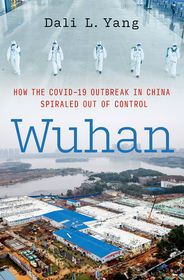
Wuhan
How the COVID-19 Outbreak in China Spiraled Out of Control
-
10% KEDVEZMÉNY?
- A kedvezmény csak az 'Értesítés a kedvenc témákról' hírlevelünk címzettjeinek rendeléseire érvényes.
- Kiadói listaár GBP 27.99
-
13 372 Ft (12 735 Ft + 5% áfa)
Az ár azért becsült, mert a rendelés pillanatában nem lehet pontosan tudni, hogy a beérkezéskor milyen lesz a forint árfolyama az adott termék eredeti devizájához képest. Ha a forint romlana, kissé többet, ha javulna, kissé kevesebbet kell majd fizetnie.
- Kedvezmény(ek) 10% (cc. 1 337 Ft off)
- Kedvezményes ár 12 035 Ft (11 462 Ft + 5% áfa)
Iratkozzon fel most és részesüljön kedvezőbb árainkból!
Feliratkozom
13 372 Ft

Beszerezhetőség
Becsült beszerzési idő: A Prosperónál jelenleg nincsen raktáron, de a kiadónál igen. Beszerzés kb. 3-5 hét..
A Prosperónál jelenleg nincsen raktáron.
Why don't you give exact delivery time?
A beszerzés időigényét az eddigi tapasztalatokra alapozva adjuk meg. Azért becsült, mert a terméket külföldről hozzuk be, így a kiadó kiszolgálásának pillanatnyi gyorsaságától is függ. A megadottnál gyorsabb és lassabb szállítás is elképzelhető, de mindent megteszünk, hogy Ön a lehető leghamarabb jusson hozzá a termékhez.
A termék adatai:
- Kiadó OUP USA
- Megjelenés dátuma 2024. március 1.
- ISBN 9780197756263
- Kötéstípus Keménykötés
- Terjedelem416 oldal
- Méret 226x165x48 mm
- Súly 726 g
- Nyelv angol 641
Kategóriák
Rövid leírás:
In Wuhan: How the COVID-19 Outbreak in China Spiraled Out of Control Dali L. Yang provides a definitive account of China's response to the Covid-19 outbreak in Wuhan. Examining the first six months of the outbreak, Yang details the government's handling of information about the epidemic and the decisions that shaped the scale and scope of the outbreak. Not just an unprecedented portrait of China's initial response to what quickly turned into a global pandemic, Yang provides a genuinely unique window into how the Chinese communist regime governs.
TöbbHosszú leírás:
The definitive account of the Chinese government's response to the initial Covid-19 outbreak in Wuhan.
The Covid-19 pandemic, which began as an outbreak in Wuhan in late 2019, has claimed millions of lives and caused unprecedented disruptions. Despite its generation-defining significance, there has been a surprising lack of independent research examining the decisions and measures implemented in the weeks leading up to the Wuhan lockdown, as well as the missteps and shortcomings that allowed the novel coronavirus to spread with minimal hindrance.
In Wuhan: How the COVID-19 Outbreak in China Spiraled Out of Control, Dali L. Yang scrutinizes China's emergency response to the Covid-19 outbreak in Wuhan, delving into the government's handling of epidemic information and the decisions that influenced the scale and scope of the outbreak. Yang's research reveals that China's health decision-makers and experts had an excellent head start when they implemented a health emergency action program to respond to the outbreak at the end of December 2019. With granular detail and compelling immediacy, Yang investigates the political and bureaucratic processes that hindered information flows and sharing, as well as the cognitive framework that limited understanding of the virus's contagiousness and hampered effective decisions.
Yang's research uncovers that urgent warnings from sources outside Wuhan helped shift the Chinese health leadership's focus towards epidemic control. Once this shift occurred, China's party-state mobilized resources and enforced a lockdown in Wuhan. This lockdown was divided into two phases: providing additional medical resources and enforcing community-level lockdowns and home confinement. The 76-day lockdown contained the virus within China's borders, but the leadership and public later faced the challenge of reopening China in a world still grappling with SARS-CoV-2.
Wuhan: How the COVID-19 Outbreak in China Spiraled Out of Control also critiques the Chinese authorities for prioritizing dominance and control in their response to the Wuhan outbreak. This preoccupation led to the suppression, distortion, and neglect of crucial disease information, fostering an atmosphere of organized silence. The punishment of whistleblowers and the banning of the immediate release of research findings on the novel coronavirus further contributed to this silencing. Yang emphasizes the importance of retaining public trust during a pandemic and underscores the need for transparency, openness to new information, and direct communication of risk with the public.
Yang's expertise in Chinese bureaucratic politics and public health governance, along with the profound impact of infectious disease on his family story in China, shines through in this insightful and compelling narrative. His timely book provides a detailed account and accessible analysis of how the COVID-19 crisis unfolded in China.
Tartalomjegyzék:
1. Thinking About China's Response to the Covid-19 Outbreak
2. The Party-State, Fragmented Authoritarianism, and the Health Emergency Response Regime
3. The Wuhan Alarm: Unusual Pneumonia Cases and a SARS-Like Coronavirus
4. The New Year's Eve Meeting: The Huanan Seafood Market and the Health Emergency Action Program
5. The Stability Imperative and the Silencing of Doctors
6. The NHC, Pathogen Verification, and Laboratory Regulation
7. China CDC, the Huanan Seafood Market, and Epidemiological Tunnel Vision
8. Fragmented authoritarianism, Inclusion-Exclusion Criteria, and Suppression of Case Submissions
9. The Wall of Silence Surrounding Health Worker Infections
10. Conducting Public Health Emergency Response in Stealth
11. The Decision to Seal Wuhan Off
12. “The Battle for Wuhan”
13. The Wuhan Lockdown: The Party-State and Community Enforcement of Home Confinement
14. Conclusion: How Did It Happen? What Could Have Been?




